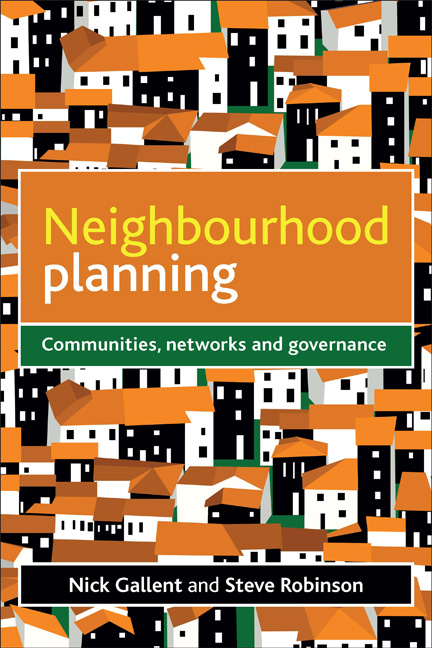Book contents
- Frontmatter
- Dedication
- Contents
- List of figures, images and table
- Abbreviations
- Acknowledgements
- Authors’ note
- Part One Democracy, planning and localism
- Part Two Capacity building and community-based planning
- Part Three The interface with policy actors
- Part Four Neighbourhood planning, leadership and democratic renewal
- References
- Index
thirteen - Planning's critical interface
Published online by Cambridge University Press: 07 September 2022
- Frontmatter
- Dedication
- Contents
- List of figures, images and table
- Abbreviations
- Acknowledgements
- Authors’ note
- Part One Democracy, planning and localism
- Part Two Capacity building and community-based planning
- Part Three The interface with policy actors
- Part Four Neighbourhood planning, leadership and democratic renewal
- References
- Index
Summary
All the chapters detailing the discussions that took place with community groups and service providers in Ashford are intended to offer an insight into the dynamics of relationships, and into outcomes, at planning's critical interface between policy producers and user communities. This interface looks set to become more critical in the years ahead as planners and community groups begin to navigate their way through the emergent neighbourhood planning agenda. It appears that much will have to change in the relationship between these key groups. Only a fundamental shift in the way that professionals think about their roles, and communities think about their responsibilities, will deliver the new culture of planning that practicable localism appears so dependent on. This chapter completes the task of drawing insights from the case study. It is retrospective, in the sense that it looks back on past experiences of community-based planning and interaction with policy makers. But it is also prospective in that it teases out challenges going forward.
Communities: participants or recipients?
In a world of top-down targets, all local actors were, in a sense, recipients of decisions beamed down either from the regions or from the centre. Local authorities appeared sometimes powerless in the face of many decisions and this reality played some part in the Labour Party's electoral defeat in 2010. However, when in government, Labour did much to promote community leadership and participative local governance. Yet, for many communities the reality was far removed from the rhetoric. Participation meant either ‘blessing’ decisions that had already been made or ‘irritating’ decision makers enough to make them, occasionally, stop and think. The description of parish councils as ‘fleas on a chimpanzee’, from Chapter Nine, neatly summed up how many parishes viewed their role.
Despite the rhetoric of the 2000s, parish groups in Ashford remained recipients of decisions made elsewhere: not only in London and in the regional assembly's office in Guildford, but also by the local council, citing many examples of policies and projects presented as fait accompli. Some parishes felt that they were given a serious hearing, that consultation was a task that the local authority undertook with real integrity, but that ultimately decisions were reached that rarely reflected parish concerns.
- Type
- Chapter
- Information
- Neighbourhood PlanningCommunities, Networks and Governance, pp. 163 - 178Publisher: Bristol University PressPrint publication year: 2012

